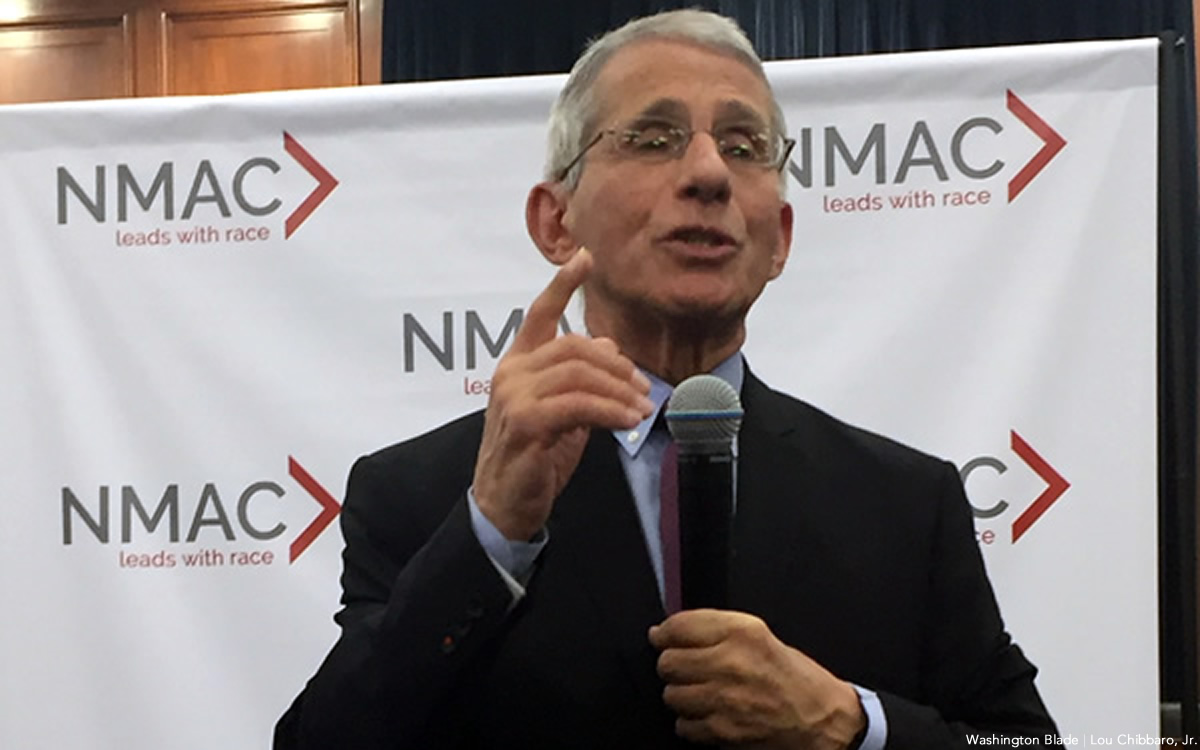Federal Government
Anthony Fauci, leader in HIV/AIDS and COVID epidemics, confirms plan to retire
WH adviser remembered by gay community

Anthony Fauci, a leading epidemiologist who advised seven presidents and had a major role in the HIV/AIDS and COVID epidemics, has confirmed plans to retire from his role in the U.S. government.
Fauci, the longtime director of the National Institute of Allergy & Infectious Diseases and now chief medical adviser to President Biden, signaled he plans to retire in December in a statement Monday.
Fauci, however, is quoted in the New York Times as saying he’s “not retiring in the classic sense” but would devote himself to traveling, writing, and encouraging young people to enter government service.
“So long as I’m healthy, which I am, and I’m energetic, which I am, and I’m passionate, which I am, I want to do some things outside of the realm of the federal government,” Dr. Fauci was quoted as saying, reportedly adding he intends to draw on his experience in public health and public service to “hopefully inspire the younger generation.”
As noted in The New York Times, the announcement from the 81-year-old Fauci wasn’t unexpected because he had been hinting for some time he was thinking of stepping down.
Fauci, a leader in the U.S. government response to the coronavirus pandemic, was seen as a major antagonist of former President Trump’s, who was criticized for downplaying the threat of the disease — and even outright lying about its danger to the American public. In turn, Fauci drew the ire of conservatives, who blamed him for making Trump look bad and for the lockdown policies they opposed.
The gay community also remembers Fauci for the lead role he took in development of treatment for HIV/AIDS during the height of the epidemic in the 1980s. Although Fauci was once among the targets of protest groups like ACT UP, he later became close friends with now deceased activist Larry Kramer.
Federal Government
HHS ‘peer-reviewed’ report calls gender-affirming care for trans youth dangerous
Advocates denounce document as ‘sham science’

The U.S. Department of Health and Human Services on Nov. 19 released what it called an updated “peer reviewed” version of an earlier report claiming scientific evidence shows that gender-affirming care or treatment for juveniles that attempts to change their gender is harmful and presents a danger to “vulnerable children.”
“The report, released through the Office of the Assistant Secretary of Health, finds that the harms from sex-rejecting procedures — including puberty blockers, cross-sex hormones, and surgical operations — are significant, long term, and too often ignored or inadequately tracked,” according to a statement released by HHS announcing the release of the report.
“The American Medical Association and the American Academy of Pediatrics peddled the lie that chemical and surgical sex-rejecting procedures could be good for children,” said HHS Secretary Robert F. Kennedy Jr. in the HHS statement, “They betrayed their oath to first do no harm, and their so-called ‘gender affirming care’ has inflicted lasting physical and psychological damage on vulnerable young people,” Kennedy says in the statement.
The national LGBTQ advocacy organizations Human Rights Campaign and GLAAD issued statements on the same day the HHS report was released, denouncing it as a sham based on fake science and politics.
HRC called the report “a politically motivated document filled with outright lies and misinformation.”
In its own statement released on the same day the HHS report was released, HRC said HHS’s so-called peer reviewed report is similar to an earlier HHS report released in May that had a “predetermined outcome dictated by grossly uninformed political actors that have deliberately mischaracterized health care for transgender youth despite the uniform, science backed conclusion of the American medical and mental health experts to the contrary.”
The HRC statement adds, “Trans people’s health care is delivered in age-appropriate, evidence-based ways, and decisions to provide care are made in consultation with doctors and parents, just like health care for all other people.”
In a separate statement, GLAAD CEO Sarah Kate Ellis called the HHS report a form of “discredited junk science.” She added the report makes claims that are “grossly misleading and in direct contrast to the recommendations of every leading health authority in the world … This report amounts to nothing more than forcing the same discredited idea of conversion therapy that ripped families apart and harmed gay, lesbian, and bisexual young people for decades.”
In its statement announcing the release of its report, HHS insists its own experts rather than those cited by its critics are the ones invoking true science.
“Before submitting its report for peer review, HHS commissioned the most comprehensive study to date of the scientific evidence and clinical practices surrounding the treatment of children and adolescents for ‘gender dysphoria,’” the statement continues. “The authors were drawn from disciplines and professional backgrounds spanning medicine, bioethics, psychology, and philosophy.”
In a concluding comment in the HHS statement, Assistant Secretary for Health Brian Christine says, “Our report is an urgent wake-up call to doctors and parents about the clear dangers of trying to turn girls into boys and vice versa.”

President Donald Trump on Wednesday signed a bill that reopens the federal government.
Six Democrats — U.S. Reps. Jared Golden (D-Maine), Marie Gluesenkamp Perez (D-Wash.), Adam Gray (D-Calif.), Don Davis (D-N.C.), Henry Cuellar (D-Texas), and Tom Suozzi (D-N.Y.) — voted for the funding bill that passed in the U.S. House of Representatives. Two Republicans — Thomas Massie (R-Ky.) and Greg Steube (R-Fla.) — opposed it.
The 43-day shutdown is over after eight Democratic senators gave in to Republicans’ push to roll back parts of the Affordable Care Act. According to CNBC, the average ACA recipient could see premiums more than double in 2026, and about one in 10 enrollees could lose a premium tax credit altogether.
These eight senators — U.S. Sens. Catherine Cortez Masto (D-Nev.), Dick Durbin (D-Ill.), John Fetterman (D-Pa.), Maggie Hassan (D-N.H.), Tim Kaine (D-Va.), Angus King (I-Maine), Jacky Rosen (D-Nev.), and Jeanne Shaheen (D-N.H.) — sided with Republicans to pass legislation reopening the government for a set number of days. They emphasized that their primary goal was to reopen the government, with discussions about ACA tax credits to continue afterward.
None of the senators who supported the deal are up for reelection.
King said on Sunday night that the Senate deal represents “a victory” because it gives Democrats “an opportunity” to extend ACA tax credits, now that Senate Republican leaders have agreed to hold a vote on the issue in December. (The House has not made any similar commitment.)
The government’s reopening also brought a win for Democrats’ other priorities: Arizona Congresswoman Adelita Grijalva was sworn in after a record-breaking delay in swearing in, eventually becoming the 218th signer of a discharge petition to release the Epstein files.
This story is being updated as more information becomes available.
Federal Government
41 days and counting: Arizona’s Adelita Grijalva says ‘this has gone way too far’
Representative Adelita Grijalva sits down with the Blade to discuss the Epstein files, transgender rights, and her fight to represent Arizona.

Adelita Grijalva, the recently elected representative from Arizona’s Seventh Congressional District, has already begun making history—without having stepped foot into the Capitol. Grijalva is now officially the longest-delayed member of the House to be sworn in—41 days and counting.
She was elected in a special election on Sept. 23 by a two-to-one margin over her Republican opponent, following the death of her father, Raúl Grijalva, who had represented the district from 2003 until early 2025. The district includes a large portion of Arizona’s southern border with Mexico.
Despite being elected more than 40 days ago, Grijalva has not been given the opportunity to begin her work representing Arizona in the House of Representatives.
Mike Johnson, the Speaker of the House and a representative from Louisiana, has offered several explanations for the delay in swearing in Grijalva—ranging from waiting until all votes were certified in the special election (despite not requiring Republicans who also won special elections to wait) to claiming the House needed to return from recess (despite precedent showing new members are typically sworn in the day after their election, regardless of whether the House is in session). Most recently, Johnson has said Grijalva will not be sworn in until the government reopens.
The Washington Blade sat down with Grijalva to discuss the historic delay in her swearing-in, the importance of protecting transgender rights, book bans, environmental issues, and much more.
While Speaker Johnson has given many explanations for the delay, Grijalva said one stands out above the rest—the Epstein files. She ran on a promise to sign a discharge petition to force a vote for the release of the complete Epstein files, a hypothesized document containing the names of high-profile clients to whom the American financier and convicted child sex offender Jeffrey Epstein trafficked young girls. Her signature on the petition would be the 218th, the minimum number required to force a vote.
“I’ve now broken all the records for speaker obstruction. Nobody else has ever had to wait this long just to represent their constituents… I never received one communication directly from his office,” Grijalva said of Speaker Johnson’s lack of reasoning for the delay. “It seems to me they’re doing everything they can to stop the release of the Epstein files, and I just don’t know what else it could be.”
She added that Johnson’s obstruction isn’t just about her—it’s about the people she was elected to serve.
“We have 812,000 people here in Congressional District 7, and my problem is there’s so much we can’t do,” she said. “So when Speaker Johnson has little side comments to say about what I should and shouldn’t be doing, it’s like—why don’t you do your job so I can do mine?”
For Grijalva, the issue isn’t partisan—it’s about principle. “It shouldn’t matter my party. I won my election fairly and legally, and there’s no reason why my voters should be punished because the Speaker doesn’t like what I stand for,” she said.
She also pointed out the irony that her call for transparency on the Epstein files mirrors one made by Donald Trump himself during his presidential campaign.
“Trump ran on day one, ‘I’m going to release those files,’ and I think he got into office, saw what was in them, and said, ‘Maybe we wait on that,’” she explained. “That’s what I feel is happening now—they’re trying to delay and distract from something that’s going to make a lot of powerful people look bad.”
Still, Grijalva said not all Republicans support Johnson’s decision to keep her from being sworn in. “A couple Republicans have said, ‘Yeah, she should be sworn in. This is crazy.’ I appreciate that—it shouldn’t matter my party. I should be sworn in, period. I think some people on their side know this has gone way too far.”
As the government shutdown drags on, Grijalva said the consequences of congressional inaction are becoming increasingly dire for ordinary Americans.
“Who’s really suffering are the federal workers—people on federal grants, SNAP benefits—who don’t know when they’ll get their next paycheck or how they’ll feed their families,” she said. “These are real-life consequences while they play political games.”
Her frustration over the Epstein files remains steadfast. Grijalva said accountability and transparency must come before politics.
“I don’t care who’s implicated. I don’t care what party they are. If you committed a crime—if you raped children and women—you deserve legal consequences. Survivors deserve transparency and justice so they can begin healing.”
Beyond political accountability, Grijalva also emphasized the urgent need to address environmental degradation—a crisis that hits especially close to home.
“Trump doesn’t care about our environment. If there’s a dollar to be made, he’s going to do it, and he’s not thinking about the long-term consequences for people who actually have to live with the damage,” she said.
The Trump-Vance administration has rolled back a slew of Biden-era environmental policies, from pulling the U.S. out of the Paris Climate Accords to weakening pollution standards and expanding drilling for fossil fuels. For Grijalva, these choices have real, human consequences.
“My dad lived in a Superfund site and drank poisoned water for 15 years. Cancer is now part of our family because of that. These policies aren’t abstract—they hurt real people.”
Her father, the late Raúl Grijalva, passed away from lung cancer earlier this year. The Environmental Working Group estimates that between 100,000 and 122,000 cancer cases in the U.S. may stem from contaminated water—something Grijalva said her family understand all too well.
She also pointed out how allowing environmental destruction by repealing laws meant to protect natural resources threatens Arizona’s economy and identity.
“Arizona is an ecotourism hotspot—there are thousands of jobs tied to protecting our lands. When you destroy it, you can’t put it back together,” she said. “The mining laws are so old that we don’t even get any proceeds for years. It’s like someone digging in your backyard, taking your gold, and then telling you to buy it back later.”
“When people say environmental protection isn’t a priority, I just think of my dad and of our state,” she added. “You don’t gamble with people’s health for a quick profit.”
Shifting to social issues, Grijalva spoke at length about protecting transgender rights during a time when many—particularly on the right—continue to villainize the community.
“Trans rights are human rights. That’s it,” she said firmly. “When I say I’ll speak up for those who don’t feel they have a voice, I mean everybody—especially people who’ve been pushed to the margins.”
She didn’t shy away from calling out members of her own party who, in her view, haven’t done enough. “It’s disappointing that some Democrats are willing to stay silent as a whole community is being attacked,” she said. “Maybe they’ve never known what it’s like to be targeted, but once you have, you stand up for those who need more support.”
“I believe gender-affirming care is life-saving care,” she continued. “We have to push back against these anti-LGBTQ laws and fight for the Equality Act because the federal government has a responsibility to protect people, not erase them.”
“It’s not the government’s business who you love or who you are,” she added. “You should have the autonomy to be whoever you want to be—that is America.”
The congresswoman also spoke passionately about the growing movement to ban books and target libraries—something she called “deeply personal.”
“I’m not only the wife—I’m the daughter and sister of librarians,” Grijalva said with a laugh. “So if I’m not an advocate for our libraries, I’m in a lot of trouble. There should not be banned books. Those stories are a lifeline for students who don’t have support at home.”
She recalled a conversation that underscored her frustration with the movement. “A woman once showed me a book and said, ‘Do you think this should be available to children?’ I said, ‘Are the pictures anatomically inaccurate? Because if they’re correct, why do you care?’ We shouldn’t be policing truth or reality just because it makes some adults uncomfortable.”
Public service, for Grijalva, has always been personal. She was the youngest woman ever elected to the Tucson Unified School District Governing Board in 2002 and served in that role for 20 years—making her one of the longest-serving board members in history.
“I’ve been in elected office for 22 years,” she reflected. “People from high school tell me I’m the same person—and that’s what I want. You don’t let the environment change you; you change the environment.”
“I always have to look my kids in the eye at the end of the day,” she added. “If I have to explain a vote too much, then it’s wrong. That’s the standard I hold myself to.”
Even amid the uncertainty of her delayed swearing-in, Grijalva said she remains focused on the people she was elected to serve.
“The privilege of being able to speak for 812,000 people—it’s overwhelming, but it’s such an honor,” she said. “I’m excited to get sworn in and finally start doing the work my community sent me to do.”
-

 Congress1 day ago
Congress1 day agoEXCLUSIVE: George Santos speaks out on prison, Trump pardon, and more
-

 Health4 days ago
Health4 days agoThe harsh truth about HIV phobia in gay dating
-

 Arts & Entertainment5 days ago
Arts & Entertainment5 days agoCynthia Erivo, Eva Victor, and ‘Blue Moon’ bring queer representation to Golden Globe film nominations
-

 Spain3 days ago
Spain3 days agoVictory Institute honors transgender Spanish senator in D.C.


















